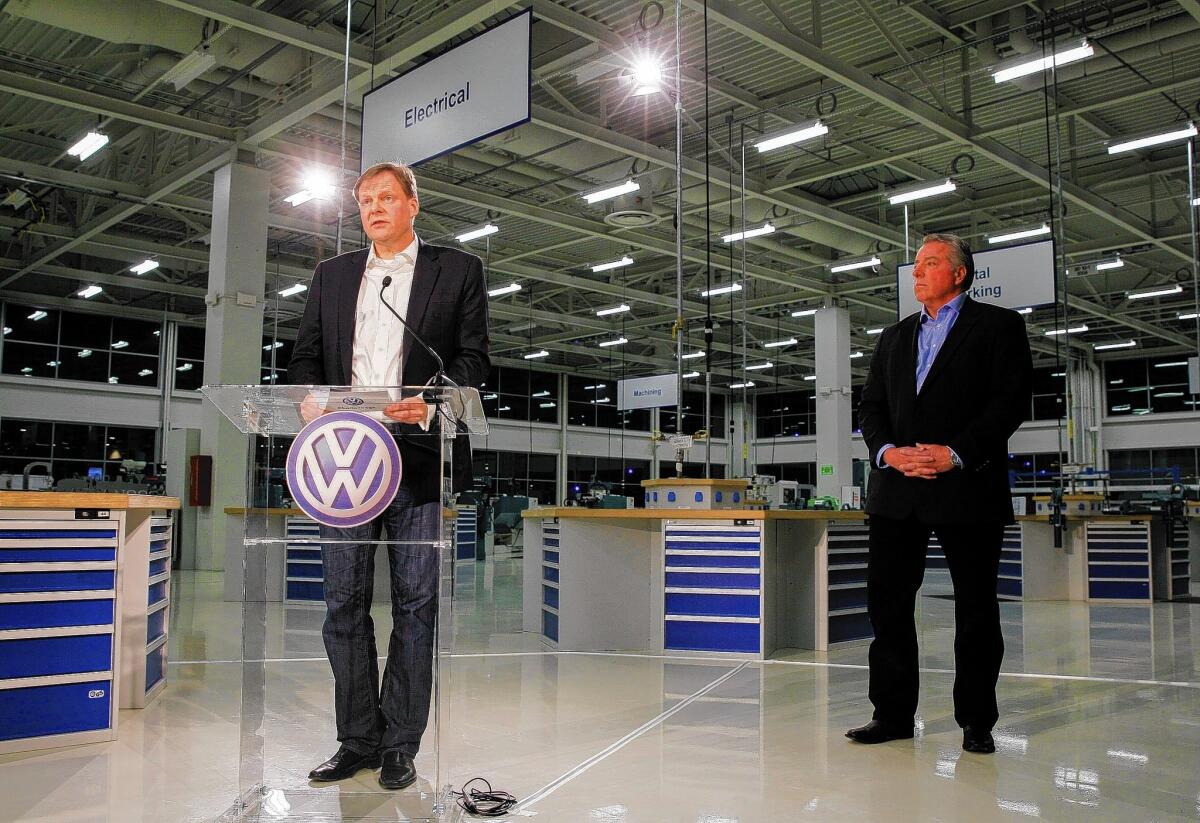UAW may challenge loss at VW factory in Tennessee

Turning more than 1,500 painters, inspectors, tradespeople and maintenance workers at a Tennessee auto plant into union members was supposed to be relatively easy for the United Auto Workers union, experts on organized labor said.
The effort would have created the first union at a foreign-owned automaker in the historically anti-union South — and raised the morale of a union that has seen membership plummet from 1.5 million in 1979 to 380,000 last year.
But 53% of workers at the 3-year-old Volkswagen factory in Chattanooga rejected a unionization bid, giving pro-union autoworkers from Michigan to Mississippi a reason to squirm and providing what experts said was the latest sign that conservative efforts and the threat of job losses were crippling U.S. labor unions.
UAW officials suggested that they may challenge the 712-626 loss, announced late Friday after a three-day vote. UAW President Bob King quickly blamed the “deeply disappointing” defeat on “unprecedented interference” by Republican politicians and political groups who said unionization would result in Volkswagen losing state subsidies and pushing production of a new crossover vehicle to Mexico instead of Chattanooga.
Workers who voted to unionize said they were sold on promises of job security and a louder voice at Volkswagen headquarters in Germany. They expressed frustration that fellow workers were apparently scared off by the threat of lost jobs — and that 165 workers declined to vote at all.
The lead opposition group warned that the UAW would generate disaster, pointing to struggling Detroit automakers and their workers, who had to accept stinging concessions because of the companies’ financial troubles.
“The UAW tried to promise significant wages, and I think that was shown as a simple, unfillable campaign promise,” said Maury Nicely, an attorney involved with the anti-union effort. “I like to think information got out to the employees, and they saw what was going on was just all false promises.”
The defeat in Chattanooga “significantly diminishes” the UAW’s chances of forming unions at any of the 10 or so foreign-owned auto factories in the South, said Art Wheaton, an automotive industry expert at Cornell University’s Worker Institute. Since 2011, similar unionization efforts were launched at Nissan plants in Tennessee and Mississippi, Mercedes-Benz in Alabama and BMW in South Carolina.
Many labor experts were stunned by the result because Volkswagen did not publicly oppose the UAW’s effort and has had an amicable relationship with labor organizations for some time.
The Chattanooga plant, which produces the Passat, remains Volkswagen’s only major facility worldwide without a labor organization. And a company official said after the vote that the company remained committed to finding a way to bring a so-called works council to the facility.
Under such a system, union officials negotiate compensation and big-ticket items while leaving it to a group of local workers — the works council — to formally discuss day-to-day issues with managers.
John James, a longtime management consultant for German companies and now a professor at Pace University in New York, said that at German companies an office as small as 11 employees elects a three-person works council.
“The manager at that sales office can’t even change from Pepsi to Coke in the soda machine without approval of the three people on the works council,” James said.
Citing current labor laws, experts have said works councils would be illegal without a unionized workforce. Volkswagen has said it still wants to bring one to the U.S. plant, and it’s possible another union might find better success.
“IG Metall is going to feel pretty angry that the UAW didn’t close the deal,” Wheaton said, referring to the union that represents Volkswagen workers in Germany. “I wouldn’t rule out them working with another union to organize the U.S. workers.”
Still, Volkswagen was drawn to Tennessee by subsidies and knew that the state’s leading politicians wanted to limit the power of unions.
Now, people who follow the UAW expect beefed-up anti-union campaigns wherever the UAW plans to hold its next vote. And companies won’t be as welcoming either. Last month, the UAW lodged a formal complaint alleging that Mercedes-Benz was interfering with organizing efforts.
“The single biggest group that could change the fate of the union is transplants such as Toyota, Honda and all those who have built factories in the U.S. and successfully fought off the union,” said Julius Getman, a law professor at the University of Texas at Austin.
The concern for the UAW stretches to Detroit and Normal, Ill., where it represents workers at Ford, General Motors, Mitsubishi and the now Italian-owned Chrysler. The companies can read the Volkswagen vote as a loss of influence for the UAW and hold it against the union when they next meet at a bargaining table, Wheaton said.
“Workers at the Big Three should be very worried,” he said.
Union membership nationwide has recently stagnated at about 11% of the U.S. workforce, down from 35% in the 1950s.
Myra Montgomery, 44, a final line inspector at the Chattanooga plant, had expected she would raise that figure a little bit come Monday. But as she watched the vote count, she said, a grim look took over her face.
She complained of workers being called in to work during a snowstorm last week while other Chattanooga factories shut down. “The local people who run the company here care nothing about our families, our children,” she said.
As Montgomery scrolled through her Facebook page on Saturday, she saw a link to a petition demanding that Volkswagen shutter its $1-billion Chattanooga facility and move to union-friendly Michigan.
“No matter how ridiculous and dumb things look, the pro-union supporters are not done,” she said.
More to Read
Start your day right
Sign up for Essential California for news, features and recommendations from the L.A. Times and beyond in your inbox six days a week.
You may occasionally receive promotional content from the Los Angeles Times.






